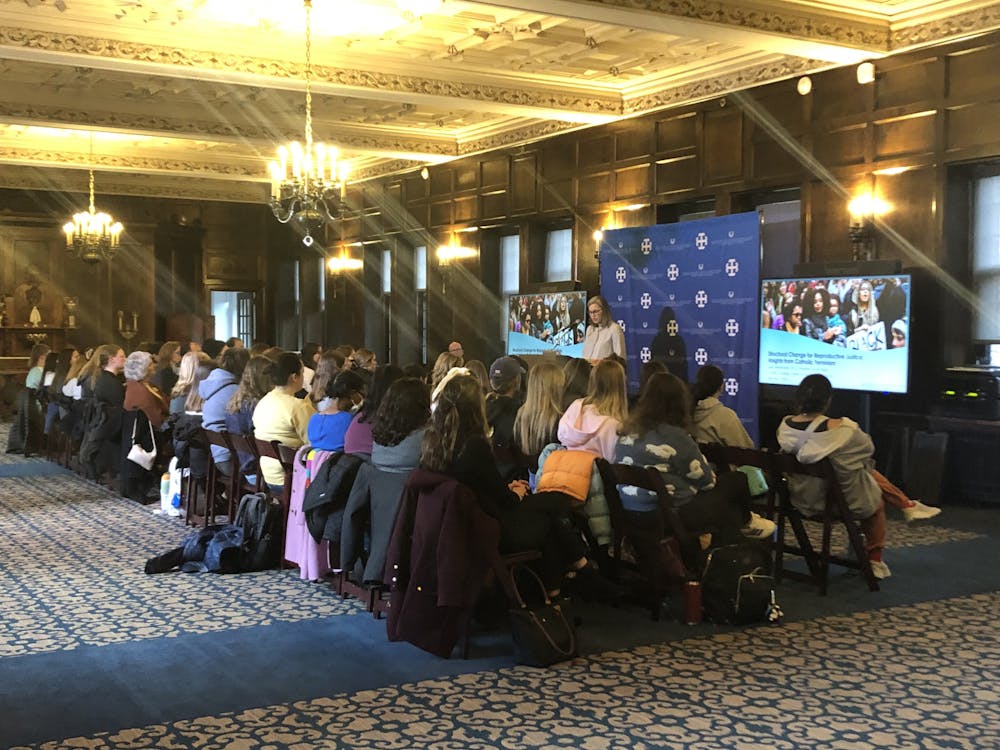On Wednesday in the Stapleton Lounge in Le Mans Hall, Saint Mary’s College hosted University of San Diego theologian Emily Reimer-Barry to discuss reproductive justice and the Catholic Church.
In her presentation “Structural Changes For Reproductive Justice: Insights From Catholic Feminism,” Reimer-Barry defined Catholic feminism as activism both within the church and the larger world.
She defined reproductive justice as “a social movement that advances the human rights agenda, focusing on the right to have a child, the right to not have a child and the right to raise children in safe and healthy conditions.”
Throughout her presentation, Reimer-Barry discussed the social conditions contributing to pregnant women’s reproductive decision-making, such as the foster care system and systemic social problems, as well as economic issues such as the prices of food, housing and hospital stays.
Reimer-Barry acknowledged the unique role that faith communities such as the Catholic Church have in supporting women who are faced with the difficult choice of whether or not to have an abortion.
“The road ahead is anything but easy. It needs to begin with honesty. Faith communities need to be honest about the very real constraints that pregnant women report,” Reimer-Barry said. “From there, I suggest that we need to summon the willpower to work on collective social change rooted in pragmatic solidarity with pregnant women. Pragmatic here means not just words of support but actual help.”
Reimer-Barry said “very little progress has been made in achieving structural justice,” since the Supreme Court’s overruling of Roe v. Wade in 2022.
She discussed issues of the carceral state as well, highlighting injustice in the immigration process and the criminal justice system. Other issues she discussed were maternal mortality rates, job loss as a result of taking time off to care for young children, unpaid leave, unaccommodating workplace environments for pregnant or nursing mothers and minimum wage.
“To see abortion as a personal choice without giving sustained attention to the structural factors that impact a pregnant woman’s decision making represents a failure of theological and social analysis,” she said.
Catherine Whittier, English literature and creative writing major, attended the lecture as part of her religious studies class.
“I don’t know exactly what I was expecting it to be about, and so I guess I went in with an open mind, and I knew there was a lot of issues on campus surrounding it, so I guess I was just curious to see what was going to happen,” she said.
Whittier said she went into the presentation thinking “it was going to be really political” in taking a divisive stance on a controversial political issue, but she instead noticed the speaker focused more on systemic adversities pregnant women face in their reproductive decision making. Whittier said she wasn’t expecting that aspect to be considered in the talk.
“I feel better having heard that talk because I feel like it discussed a lot of issues in our society not just regarding pregnant women but just society in general,” she said. “Things should not cost this much, and it shouldn’t be so hard to get food stamps and get this, so I think that was really, really interesting.”
Responding to the rosary organized outside in response to Reimer-Barry’s presentation, Whittier said, “I think it’s great to stand up for what you believe in absolutely as long as you’re not disruptive or disrupting other people’s learning, so I didn’t have a problem with it. If they strongly believe that they should have protested, then I’m happy they did that because I was still able to go and learn and they could go and learn, and it was a mutual, harmonious thing.”
For events like this in the future, Whittier said she thinks students should go with an open mind.
“I don’t know what I was expecting, so it was nice to just go and do that and support people with their different beliefs,” she said. “We have to talk about this stuff if we want change to happen, and you can’t attack people, you have to be open to listening and making changes.”










